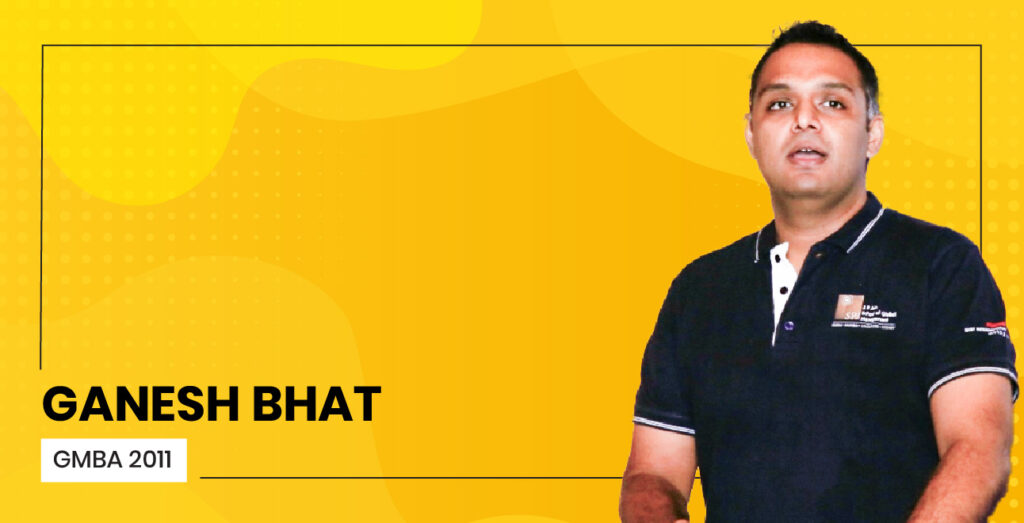The Power of Unlearning and Relearning- Ganesh Bhat’s GMBA Journey
Ganesh Bhat, the ultimate Mumbaikar at heart, can’t resist a spicy rendezvous with the city’s delectable food! A proud parent of two beautiful children, he currently resides in Australia and is an accomplished professional with an impressive educational background.
In 2011, Ganesh successfully completed the Global MBA program at SP Jain Global, following his distinction in Computer Engineering from the prestigious University of Mumbai in 2005. Before embarking on his GMBA journey, Ganesh amassed over 4 years of industry experience, showcasing his expertise in software development while working with renowned companies like Tata Consultancy Services and Infosys.
How did his GMBA education and expertise in the field drive impactful contributions to the world of data and technology? Let’s find out over a quick chat with Ganesh.

What did you like the most about SP Jain Global’s GMBA, and what skills did you acquire through the program?
To increase my knowledge and understanding of different subject areas important in running a business, I decided to pursue an MBA with a specialisation in IT Management. I chose SP Jain Global’s 1-year GMBA program as it is highly structured and focused, which helped me develop my skills and abilities in business, IT, and transformation programs. I learned the importance of unlearning and relearning. It has stayed with me as GMBA focuses on teaching skills, which needs a new mindset for learning, and at the same time, unlearning to start from scratch. I vividly remember the best classes that I attended at SP Jain Global, including E-Commerce & E-Business by Prof Sethi, Marketing Research by Dr Umesh Kothari, Quantitative Analysis by Prof Suranjan Das, Management Accounting by Prof DV Ramana, Economics by Prof Mankad, and IT Project Management by Prof Moradian. I apologise if I missed anyone, but they are the ones I remember the most. While engineering taught me how to solve problems, SP Jain Global’s GMBA program helped me to understand how to identify problems that need to be solved.
What were the projects and extracurricular activities you participated in during your time at SP Jain Global?
I participated in two research projects as a part of the GMBA program at SP Jain Global:
- IT Enablement for Supply Chain & Logistics Companies in Dubai – A Market Research project with Zensar Technologies
- Consulting to Document & Analyse the State of Open Source in Asia with Red Hat
Both these projects were very important in terms of reaching out to people in Dubai and Singapore. One thing I learned from them is that people are really helpful, and they gave us valuable time to help complete our projects.
I also participated in the inter-collegiate football competition held at NUS in Singapore, which was a fun experience.
How have you continued to benefit from GMBA even a decade after graduating? Which skills from the program can you still apply at your workplace?
Post completing my Global MBA, I built my experience in digital transformation, AI, analytics, consulting & presales, where I leveraged all the knowledge from various subject areas learned during the program to identify customer problems, provide solutions and approaches, suggest enterprise architecture, migration approaches, and finally recommend the total cost of ownership (TCO) or business benefits, likely be accrued by implementing the suggested solutions. The unlearning and relearning skill has helped me pick new skills like machine/deep learning, Python, recommendation systems, computer vision, and analytics by learning them via MOOCs.
Could you tell us more about your experience in program management and customer experience? What kind of expertise do you have in digital transformation and advanced analytics?
In today’s fast-paced and technology-driven world, businesses are constantly striving to enhance their operations, streamline processes, and deliver exceptional customer experiences. As a seasoned professional in program management and customer experience, I have had the privilege of working on diverse projects and leveraging my expertise in digital transformation and advanced analytics to drive positive change and maximise organisational performance.
Program Management and Customer Experience: Throughout my career, I have been deeply involved in program management, overseeing and coordinating multiple projects simultaneously to ensure their successful completion. I have honed my skills in project planning, resource allocation, risk management, and stakeholder engagement, enabling me to effectively navigate complex initiatives and deliver results within time and budget constraints. One of my key focuses has been on enhancing customer experience. I firmly believe that customer satisfaction is the cornerstone of business success. I have consistently strived to exceed customer expectations by leveraging data-driven insights, fostering customer-centric cultures, and implementing process improvements. I have successfully led cross-functional teams to develop and implement customer experience strategies, resulting in improved customer loyalty, increased retention rates, and enhanced brand reputation.
Expertise in Digital Transformation: In an era of rapid technological advancements, digital transformation has become a strategic imperative for organisations across industries. Recognising the importance of digitalisation, I have developed expertise in driving digital transformation initiatives. I have spearheaded projects that leverage emerging technologies like AI and cloud technologies and innovative solutions to optimise business processes, drive operational efficiency, and create new revenue streams.
My digital transformation expertise extends beyond mere technology adoption. I understand the significance of aligning digital initiatives with overarching business goals and have consistently focused on delivering tangible value to stakeholders. By leveraging my strong analytical skills and industry knowledge, I have successfully identified opportunities for digital transformation, designed robust implementation plans, and managed change effectively to ensure seamless transitions.
Advanced Analytics Proficiency: In today’s data-driven world, organisations are increasingly relying on advanced analytics to derive actionable insights and make informed decisions. I possess a deep understanding of advanced analytics techniques and tools, which I have applied in various contexts to drive organisational success as a result of which I have been able to apply for five patents in the field of AI with the Indian Patent office.
I have led projects that involve collecting, analysing, and interpreting large volumes of data to identify trends, patterns, and correlations. By leveraging statistical modelling, predictive analytics, and machine learning algorithms, I have provided valuable insights to support strategic decision-making, optimise resource allocation, and enhance operational performance.
My journey in program management and customer experience has equipped me with a diverse skill set and a deep understanding of the intricacies involved in driving digital transformation and leveraging advanced analytics. Through my experience, I have demonstrated a proven track record of successfully managing complex programs, enhancing customer experiences, and delivering sustainable business outcomes.
How do you ensure that your mobility solutions are both user-friendly and secure for your clients, and what type of knowledge management strategies do you use to support these solutions?
I follow the design thinking framework as it provides a structured approach to developing user-friendly and secure mobility solutions. The approach generally includes empathising with users to gain insights into their behaviour, challenges, and security concerns, defining their requirements by leveraging wireframes, prototyping iteratively, deploying prototypes to gather user feedback, followed up with an iterative process towards continuous improvement. Knowledge management strategies depend on the solutions, tools, and assets specific to the company, project, and use case, and hence, it varies across projects.
How do you approach implementing machine learning and deep learning solutions for your clients? What benefits have you seen from these types of projects?
I have worked within a business, and hence my clients/customers are internal businesses from whom I have worked on multiple machine and deep learning projects. The approach is pretty simple but needs rigour for success. It leverages the design thinking approach I have mentioned above with a lot of emphasis on stakeholder management, communication, planning, learning, and change management practices. Benefits are specific to the use cases, but it essentially focuses on increasing revenue, reducing costs, and improving customer experience and satisfaction.
Would you like to share your achievements in the field of data science and AI?
- Awarded among the 100 most influential AI leaders in India for 2022 by Analytics India Magazine
- Applied for five patents with the Indian Patent Office
- Successfully led a LIGHTHOUSE certification program for advanced analytics for a plant in India which was certified by World Economic Forum
What advice would you give to someone looking to develop a career in consulting, particularly in the areas of digital transformation and advanced analytics?
Learning by doing is the best approach to developing a career in any field. Always raise your hands when you see an opportunity even though you don’t know much about the domain or technology you want to get into, but that’s the best way to learn. For people getting into advanced analytics, I would suggest the following two courses in the specific order:
- Machine Learning course by Andrew Ng on Coursera
- Fast.ai course by Jeremy Howard (available for free on YouTube and his website fast.ai)
Related Posts
-
 In This World of Internationalisation, Will You Survive?
No Comments | Jul 27, 2011
In This World of Internationalisation, Will You Survive?
No Comments | Jul 27, 2011 -
 Key to great interviewing
No Comments | Aug 19, 2011
Key to great interviewing
No Comments | Aug 19, 2011 -
 The Perks of Having a Global Network
No Comments | Oct 30, 2014
The Perks of Having a Global Network
No Comments | Oct 30, 2014 -
 Breaking corporates shackles to start a wealth management boutique
No Comments | Feb 18, 2015
Breaking corporates shackles to start a wealth management boutique
No Comments | Feb 18, 2015
